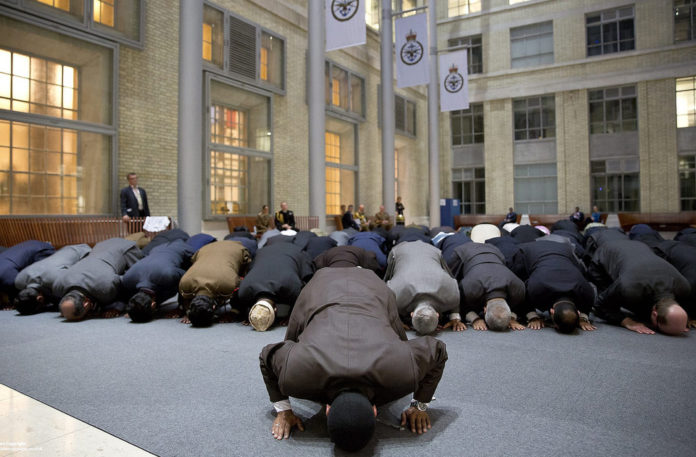Increasing the Imân which Allâh commands us to have, and which is a trait of His believing worshipers, can be achieved through different means. The first aspect in increasing Imân is through practicing ijmâl, total, observance and tafsîl, detailed, observance of Allâh’s commands, for it is the obligation of all mankind to believe in Allâh and His Messenger, and of every community to commit itself to all that the Messenger (sallAllâhu `alayhe wa sallam) has ordered. It is well known that what was obligatory at first differs from what was required after the revelation of the whole Qur’ân. Hence, unlike one who does not know about Islam, he who knows the Qurân, the Sunnah, and their meanings is obliged to have a detailed Imân. That is, if a man, inwardly as well as outwardly, believed in Allâh and the Messenger (pbuh) and died before he knew the laws of religion, he would die as a believer. His obligation and what he did are different from the Imân of the one who knew the Islamic laws and who believed in them and worked to fulfill them. The Imân of such a person is more complete, in accordance with the obligatory and the actual deeds. Indeed, of what he performed in accordance with the obligation is of a more complete Imân and what he did is also considered more complete.
Allâh says: “ This day I have perfected your religion for you ” (5:3). In this verse, the word “religion” refers to the legislation of commanded and forbidden actions, but does not mean that everybody is obliged to do what the whole community is ordered to do. It is recorded both in Sahîh Muslim and Sahîh al-Bukhari that the Prophet (pbuh) described women as diminished in intellect and religion. This diminution in intellect made the witness of two women equal in that of one man; the diminution in her religion is due to the fact that she does not pray and fast when she is menstruating. Indeed, this diminution is not a diminution of what she is commanded to do and so she will not be punished because of it. However, if someone is commanded to pray and fast and does so, his religion is complete compared to the one of diminished religion.
The second aspect [of increasing one’s Imân] is the total and detailed acts of people. To illustrate this, let us compare the Imân of the following three men. The first absolutely believed in what the Messenger (pbuh) came with and asked for, but was neither concerned about what the Messenger (pbuh) commanded and prohibited nor sought the required knowledge of religion so as to act accordingly. The second sought and obtained this knowledge and acted on it. The third man acquired knowledge, became well acquainted with it, and believed in it but did not act accordingly. These three men shared the same obligation, but the one who looked for detailed knowledge and acted on it had a more complete Imân than the one who knew and believed but did not practice his knowledge. Likewise, he who believed in the message, confessed his sins, and feared punishment was a better believer than the one who did not seek to understand what he was asked to do, and did not fear punishment; on the contrary, he later was negligent and careless, although [overtly as well as covertly] he believed in Muhammad (pbuh) as the Messenger of Allâh.
Accordingly, the more the heart knows, believes in, and practices [what Allâh and His Messenger have ordered], the more a person’s Imân increases even if that person has a general adherence and general verbal confession.
Similarly, if someone knows Allâh’s Names as well as their meanings and believes in them, his Imân is more perfect than that of someone who does not know but believes in them generally, or someone who knows only some of them. Hence, the more one knows Allâh’s Names, Attributes, and Verses, the more perfect his Imân.
The third aspect is that knowledge and assent are differentiated among people. That is, some people have stronger, more enduring Imân and assent than others whose Imân is subject to doubt. Indeed, this is something experienced by each one of us. For example, people differ in the way they see the new moon, hear the same sound, smell the same smell, and taste the same food. So it is with the heart’s knowledge and assent. People differ widely in their belief in the meanings of Allâh’s Names and His Words.
The fourth aspect is that the assent which requires the work of the heart is more complete than that which does not. So, knowledge which is accompanied by works is better than that which is not. Suppose that two men knew that Allâh, the Messenger (pbuh), Paradise, and Hell are true. The knowledge of the first man obliged him to love and fear Allâh, wish for Paradise, and avoid Hell. However, the knowledge of the second man did not lead him to do so. Thus, we can say that the knowledge of the first is more complete than that of the second. For the strength of the result signals the strength of the cause, and all these matters stem from knowledge. So knowledge of the “beloved” requires one to seek him; and knowledge of the “frightened” requires one to flee from him. However, absence of the required results signals the weakness of the cause or prerequisite. That is why the Prophet (pbuh) said: “One who is informed [indirectly] of something is not like the one who sees it for himself.”To illustrate this, when Allâh told Moses that his community worshiped the calf, he did not throw the al-Alwâh, Tablets; but when he himself saw them practicing that, he did. This is not because Moses doubted Allâh’s words but because the man who is told something, although he does not report the news of the teller, does not perceive the situation in the same way he does if he sees it for himself. Since his mind is occupied with something else, other than what the informer said, he still believes him. Certainly seeing something will give one a clearer understanding of the situation and this assent is better than the other.
The fifth aspect is that works of the heart, such as love for Allâh and His Messenger and fear and expectations from Allâh, are part of Imân, as proven by the Qurân, the Sunnah, and the consensus of the pious ancestors. And people differ widely in their performance of these works.
The sixth aspect is that overt works, as well as covert works, are part of Imân; and people also vary widely with respect to these works.
The seventh aspect is the importance of holding Allâh in remembrance and not being inattentive, since the latter opposes perfection of knowledge and acceptance. ‘Umar Ibn Habîib, one of the Companions, said: “If we thank and praise Allâh, our Imân increases. However, if we neglect and forget Him, our Imân decreases.” And Mu’âdh Ibn Jabal used to say to his companions: “ Let us sit still for an hour so as to strengthen our belief.” Allâh says: “ Nor obey any whose heart We have permitted to neglect the remembrance of Us, one who follows his own desires ” (18:28); and “And remind for indeed, reminding profits the believers” (51:55); and “The admonition will be received by those who fear [Allâh]: But it will be avoided by those most unfortunate ones” (87:10-11). Hence, it is evident that the more a man remembers what he already knows, and practices his knowledge, he will come to understand something he has never known, such as Allâh’s Names and Verses. This is supported by the following tradition: “Whoever practices what he knows, Allâh will provide him with understanding of what he did not know.” This is a matter that every believer will realize by himself.
It was recorded in Sahîh al-Bukhari that the Prophet (pbuh) said: “The one who holds Allâh in remembrance as compared to one who does not, is like a living man as compared to one who has died.” Allâh says: “And when they hear His Verses rehearsed, find their belief strengthened.” (8:2). That is, hearing of Allâh’s Verses increases their knowledge with what they did not know, it encourages their practice of the new knowledge, and it reminds them of things they have forgotten. Allâh says: “Soon will We show them Our Signs in the [furthest] regions [of the earth], and in their own souls, until it becomes manifest to them that this [the Qur’ân] is the Truth ” (41:53). That is, the Qurân is the truth. Allâh also says: “ Is it not enough that your Lord does witness all things?” (41:53). So in the Qurân Allâh is witness to what He reported. Consequently, believers believed in this and then He showed them His Signs in the furthest regions of the earth and in themselves, all of which confirms what the Qurân says. Therefore, these Signs indicate that the Qurân is the Truth.
Allâh says: “Do they not look at the sky above them? How We have made it and adorned it, and there are no flaws in it? And the earth, We have spread it out, and set thereon mountains standing firm, and produced therein every kind of beautiful growth [in pairs] to be observed and commemorated by every devotee turning [to Allâh]” (50:6-8). So the created signs should be observed and commemorated in order to prevent one from blindness and inattention. To illustrate, a man recites a Sûrah (e.g., al-Fâtihah) many times; and each time he recites it, he gains new knowledge, which in turn increases his acceptance and Imân as if the Sûrah was revealed at that moment. Thus, he believes in these meanings and his knowledge and work increases. This is to be realized by everyone who reads the Qurân attentively, in contrast with the one who reads it absentmindedly. Thus, whenever one does what he is commanded to do, he becomes aware of these commands and, as a result, he affirms his belief. Consequently, at that moment his affirmation in his heart establishes what he was unaware of even when he is truthful.
The eighth aspect is that man may deny or disbelieve things, for he does not know that the Messenger (pbuh) has spoken and ordered them. And if one knew that, he would neither deny nor disbelieve. For his heart strongly affirms that he [the Prophet] told and commanded only the truth. It may happen that when one hears a verse or a hadîth or thinks about it or someone interprets its meaning for him or it becomes clear to him what is forbidden, then he will enter a state of new affirmation and new belief. This increases his Imân since before this stage he is not considered as an unbeliever but simply as ignorant. This happens in the case of many believers who ignorantly think that an affirmation or a deed is not required for Imân but when they know the truth, they believe. Many people, including those who are conscious about religious matters, may have, in their hearts, many detailed matters that may contradict what the Messenger brought forward. Yet, they do not know that they are contradictory matters and, when they become aware of this, they reverse their opinions. Thus, anyone who introduces an innovation or a saying [to the religion of Islam] or performs a wrong act, and he is a believer in the Messenger or is aware of what the Messenger said and believes in them and does not reverse his beliefs, he is considered ignorant but not an unbeliever. It follows then that every innovator with good intentions of following what the Messenger brought forward is of this category. Thus, he who has knowledge of what the Messenger brought forward and acts accordingly, is better than he who commits an error concerning this, and anyone who becomes aware of the truth after realizing his own error and acts on it, he will be in a more preferable position than before.
(NOTE: If you want to build a strong and powerful relationship with Allah, check out Islamia TV, where you can watch Islamic speakers from across the globe deliver inspiring and motivational courses. Learn more at www.islamia.tv.)






















